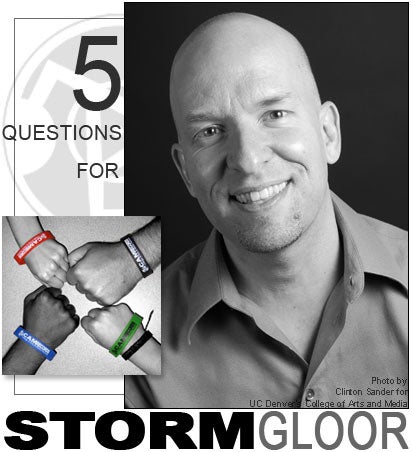Five questions for Storm Gloor
Storm Gloor is in his fourth year at the College of Arts and Media, where his CAM Records course gives students real-world experience in the music business. The label recently began marketing an unconventional music product: USB wristbands pre-loaded with music and other media. The $10 item is available for purchase from current CAM Records students, at the Auraria Campus bookstore and online at www.camrecords.org. Before coming to UC Denver, Gloor spent 13 years in music retail and wholesale, most as director of music operations for the Texas-based Hastings Entertainment.
As faculty sponsor of CAM Records, what does your role entail?
It's a course, and I teach the class. It's also a fully functioning record label, though we only meet twice a week. I'm more than a teacher or instructor — I'm also a manager, so it's like a business would be. CAM Records is a hands-on application of what the students learn in their other classes: getting contracts, working on the business and legal aspects of the business, utilizing what they learned in marketing class. What the label does generally depends on what the students in the class come up with. For instance, in the last class, we found six potential artists for future releases. We narrowed the list down to two this semester, and we hope to put out recordings by those two at the beginning of the next semester. One group of students proposed that we put out a full-length album by an artist, one group suggested we just promote the artist on campus and another group proposed we help the artist make a music video. Students are getting hands-on experience, actually working with artists, finding out what an artist does or doesn't like — learning more personally what that involves.
How did the idea for the USB wristbands come about?
We're always looking at different forms of distribution. Once, we produced a drop card, a plastic card with a code on it that enables a user to go to a Web site and download three free tracks. I challenged the students to think differently, not just putting out a CD with a bunch of tracks on it. One student, Jared Berger, started the ball rolling: What if we did a USB wristband? There were "a-ha" moments all along the way, which is what you strive for as a professor. It's still evolving, because we keep figuring out different things we can do with those wristbands. You can put Word documents and PDFs on there, so recently we thought, what if we put on there a guide to the music scene in Denver for incoming freshmen? What if we included informational pieces, like podcasts or videos about things to do in Denver?
You're from the era of vinyl, 8-track tapes, cassettes — what is it like for faculty working with students who are immersed in new technology?
I still have all of my 8-tracks and vinyl. However, I'm also a huge digital music fan. Professors always are at risk of finding themselves just behind the students in terms of technology, but I guess I would say I'm pretty hip to it. I'm a huge music fan, which is what inspired me to do what I do. I don't find the distance in technology appreciation to be that wide for me. On the other hand, I certainly enjoy working with students and learning from them. Their musical interests are different and they are much more prone to thinking outside of the box. Especially with the CAM Records class, we get in discussions about what we can do better, and they are definitely full of great ideas that aren't limited to the technology I've been used to. That is a pleasure I get from teaching.
Pop music history is filled with stories of artists who weren't smart about business — and who suffered financially because of that. Are there performers who were knowledgeable about business and therefore remained successful?
Oh, yeah, and a lot of them are superstars, like Prince and Madonna. They showed entrepreneurial prowess and the ability to market themselves very, very well. As of late, there are a lot of independent artists — Amanda Palmer, Imogen Heap — and established bands like Phish and the Dave Matthews Band who have been smart about business. Rather than fight the technology, they embrace it. They make recordings of shows available for download, they connect with fans on social networks. They're not fighting progress the way some artists do.
How challenging is it to teach about an industry that is in crisis?
It's challenging from two perspectives. One, things change so quickly, it's tough even keeping up with everything to keep students well-informed. I might tell them about a company at the beginning of the semester that seems to have a great model, and it could be bankrupt by the end of the semester. The second challenge is, how do you maintain the students' enthusiasm when they're concerned about whether they'll even land a job in this industry? I continually remind them that music consumption is the highest it's ever been. Most people aren't paying for it, granted, but there's a business out there. It's just evolving right now. It's like the outfielder who doesn't run to the ball, but runs where the ball is going to be. I keep encouraging students to run where the ball is going to be. I still think that there's a future. We just have to figure out how to monetize it for all the parties concerned.
Over 100 years of the music business, it's been through four evolutions. And every time it's come out as an even stronger, more viable business. We've got to believe that will continue to happen. The glass really is half-full, even if you don't see that right now.


